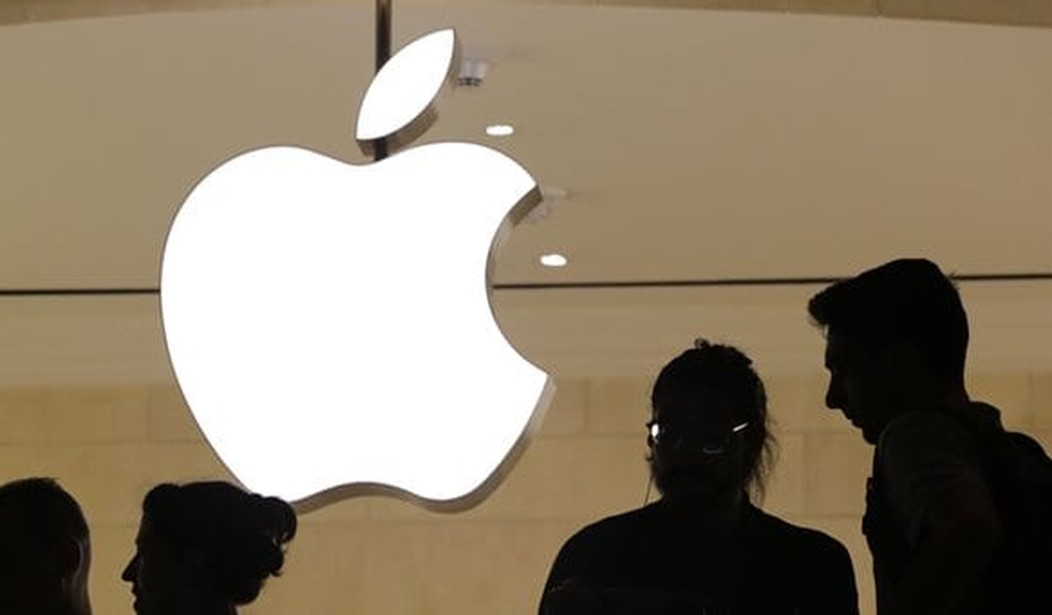The U.S. Department of Justice on Thursday announced a sweeping antitrust lawsuit against Apple Inc. accusing the company of using its proprietary software and hardware to illegally stifle competition. Fifteen states and the District of Columbia also signed on to the complaint.
The suit is not a surprise and has been in the works for years. Attorney General Merrick Garland took time off from pursuing former President Donald Trump to accuse the tech giant of wielding monopoly power:
The complaint, said Attorney General Merrick Garland at a news conference, alleges that ”Apple has maintained monopoly power in the smartphone market not simply by staying ahead of the competition on the merits but by violating federal antitrust law.”
“Consumers should not have to pay higher prices because companies break the law,” he added.
BREAKING: Attorney General Merrick Garland announces Antitrust Lawsuit Against Apple for 'Unlawful Exclusionary Behavior', says, "Apple has maintained its power not because of its superiority, but because of its unlawful exclusionary behavior." WATCH pic.twitter.com/ldAsGZmmKP
— Simon Ateba (@simonateba) March 21, 2024
Apple has long faced claims that they manipulate the marketplace:
The long-anticipated lawsuit, which was filed in the US District Court for the District of New Jersey, comes after years of allegations by critics that Apple has harmed competition with restrictive app store terms, high fees and its “walled-garden” approach to its hardware and software: Apple famously makes its tech easy to use, but it achieves that by tightly controlling – and in some cases, restricting – how third-party companies can interact with the tech behemoth’s products and services. In some cases, Apple may give its own products better access and features than its competitors.
Apple makes some exceptional products, but I’ve always felt constrained by their operating systems—in effect, they say, here’s our computer, here’s our software, and that’s the end of the discussion. As the programmer for the business I ran for many years, I wanted to get into the guts of the system and customize it to my liking; Windows and Linux operating systems offer much more access to their inner operations. (It isn't simply about personalization; it's about getting your system to function the way that optimizes its capabilities for your business needs. Hence, many creatives worship Apple products, a space where they dominate, but many businesses eschew them.)
Same with iPhones—you can’t get inside the OS, and you can’t make substantive changes—whereas, with the Android system, you can tailor the software to suit your unique requirements.
Geek stuff, I know—but actually relevant because the DOJ is accusing Apple of locking out third-party apps and smothering competition. For example:
The company also gives its own products the ability to access certain parts of its hardware that it restricts other companies from using. That unleashes an almost magical experience for how iPhones interact with AirTags, when competitors’ products are far more limited in their capabilities.
“Apple creates barriers that make it extremely difficult and expensive for both users and developers to venture outside the Apple ecosystem,” Garland said on Thursday.
Apple fired back, saying government intrusion in the world of personal technology was overreaching and unnecessary.
The company said it denied the lawsuit’s allegations and would fight them and added that the lawsuit could empower government “to take a heavy hand in designing people’s technology.”
But Garland on Thursday said Apple’s actions have wide-ranging effects.
“Monopolies like Apple’s threaten the free and fair markets upon which our economy is based. They stifle innovation. They hurt producers and workers and increase cost for consumers,” Garland said Thursday.
“If left unchallenged, Apple will only continue to strengthen its smartphone monopoly. But there’s a law for that,” he added.
Sen. "Based" Mike Lee (R-UT) seemingly endorsed the move:
What began in the Trump Administration’s review of anticompetitive conduct by big tech platforms culminated in DOJ’s lawsuit against Apple today. In the Senate, I continue to fight for important legislation to end Big Tech monopolists’ grip on our economy and to further promote… https://t.co/8nTkg6ME5p
— Mike Lee (@BasedMikeLee) March 22, 2024
In the Senate, I continue to fight for important legislation to end Big Tech monopolists’ grip on our economy and to further promote competition.
While I am usually disturbed by Big Government overstepping its bounds and meddling in the affairs of private companies, I do think Apple's methods deserve scrutiny. A little example: my family begged me to get an iPhone—even though I was quite satisfied with my Android-powered Galaxy Edge—because Apple's messaging features are far superior and work especially well for group chats. However, Apple makes it impossible for me to text from my Windows computer (like I used to do); I have to go to my phone and laboriously type it out with my fat fingers. (Alternatively, I can type it on my computer, put it in "Notes," then copy and paste it on my phone... I know, I know, boring.)
I readily admit this is a first-world problem and not the end of the world, but that being said, it's also a serious inconvenience, and there's no reason why it should be so except that Apple refuses to play friendly. There are myriad more examples of Apple punishing users of non-Apple products.
Microsoft has used many of the same tactics over the years, and anyone who uses Windows knows that it's constantly trying to harangue you into using its Edge browser despite the fact that Google Chrome has consistently innovated at a faster pace.
I don't trust Merrick Garland any further than I can throw him, but it will be interesting to see where this case goes. Will it lead to more innovation and compatibility, or is it just another grab by the federal government where they hope to squeeze billions out of Apple? Some of my personal petty complaints might seem like silly stuff, but on an industry-wide scale in today's technology-powered world, these things actually matter.
We'll keep you posted.














Join the conversation as a VIP Member